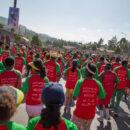South Sudan: Rumours
An article in the East African newspaper yesterday speculated that western nations were backtracking on their commitment to self-determination in southern Sudan. Based on unnamed sources, and with no hard evidence, and with just one quote from a US embassy official who in fact said that the US remained committed to the CPA timetable, the article fueled fears among southern Sudanese that there is a growing international conspiracy to deny them the right to the independence option in next year’s referendum. This is reminiscent of the furore that followed the remarks by AU Chairperson Jean Ping and UN Secretary General Ban Ki-Moon at the AU summit two months ago, in which both said they preferred the unity of Sudan.
Southern Sudanese sensitivities over whether they will be able to exercise the secession option have grown as the date has approached. Southern Sudanese are aware that the CPA obliges the parties to work for unity, and know that the international guarantors of the CPA will therefore, at the very minimum, pay lip service to the unity preference. They also know that all African states, and the AU, are instinctively pro-unity. The very purpose of the AU is to bring African countries closer together, and so it will obviously treat any secessionist tendencies with suspicion, and only support secession in exceptional circumstances.
Southern Sudanese sensitivities are understandable. But it is important to read the signals carefully and not jump to conclusions. Southern Sudanese have enough challenges in front of them in the next year, and don’t need to be fighting shadows.
The AU, UN and western countries are all committed to the CPA with its two options of unity and secession. None has the capacity to prevent secession even if they wanted to do so. (See the recent Council on Foreign Relations report by Kate Almquist for a balanced and forward-looking assessment.) For all of them, the credibility of their commitment to an agreement counts for a great deal. They believe in the rule of law and cannot repudiate a commitment without paying a price. And since the CPA, they have committed themselves to the right of self-determination, and this cannot easily be reversed.
Without doubt, the international community is concerned about the consequences of secession, especially if it is carried out in a contested way. African states are certainly worried about the precedent that will be set: there are actual or potential secessionists in many countries in Africa. But they also know that the case of southern Sudan is exceptional, and that the AU and IGAD cannot readily renege on the commitment to the CPA.
Another interesting rumour is that IGAD is pro-secession while the AU is pro-unity. This is the kind of political gossip that doesn’t survive scrutiny. The chair of IGAD is Ethiopia, and it is inconceivable that the Ethiopian government would take IGAD in a different direction to the AU. IGAD’s involvement in CPA implementation at this stage will strengthen the AU, not undermine it.
However, because they are so sensitive to any hints of backsliding on self-determination, some southern Sudanese were ready to believe in, and encourage, the idea that IGAD might take an opposite tack to the AU. It is the sort of superficially clever, but actually inaccurate, reading of politics that could have led southern Sudanese into a blind diplomatic alley.
Far more useful is to monitor how the AU and the western governments actually respond to real events. There have been two important areas of progress in the last few months, and in each case a perceptible shift in diplomatic attitudes has followed.
One is that negotiations between north and south on the CPA endgame and post-referendum arrangements have begun. The NCP and SPLM have shown that they are willing and capable finding negotiated solutions to their differences.
The second is that the southern Sudanese are confounding the sceptics and managing the elections well. In fact, holding the elections before the referendum is turning out to be a considerable if unanticipated blessing. The imminence of the referendum provides a stabilizing force, reducing tension and the risk of conflict. But it is still a test of the government against the views of the people. It means that not just the pre-referendum Government of Southern Sudan, but also the post-referendum Government, will be legitimized by election. In a year’s time, that Government will be less than a year in office, with enough time in its remaining term to handle the immediate post-referendum tasks.
There’s no doubt that southern Sudan faces immense challenges. But under the pressure of the CPA deadlines, problems are being solved, and scenarios of lawlessness and state failure are fading away.
Southern Sudan is on the rise – there’s a rumour that should be circulated in the press.






